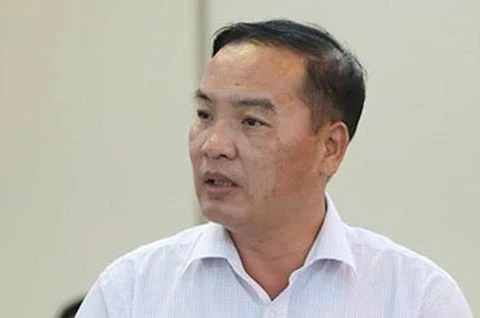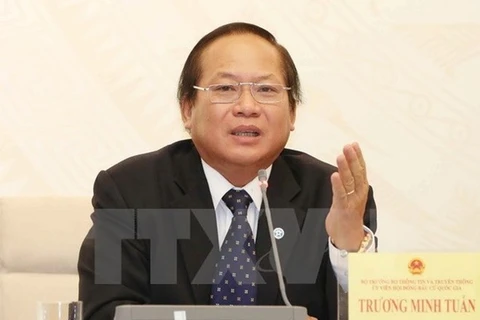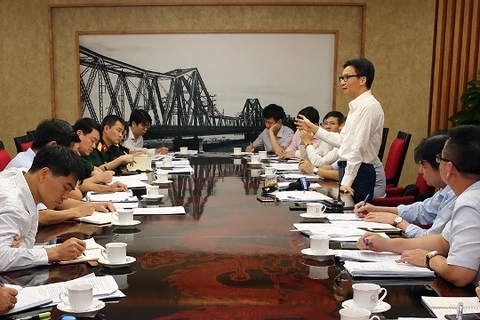 Cao Duy Hai has been dismissed from his position as general director of MobiFone. (Photo: danviet.vn)
Cao Duy Hai has been dismissed from his position as general director of MobiFone. (Photo: danviet.vn) Hanoi (VNS/VNA) - MobiFone, one of Vietnam’s three largest mobile network operators, has reported a year-on-year decline of 42 percent in post-tax profit in the second quarter of this year, falling to 947 billion VND (41 million USD).
The company earned 8.42 trillion VND in revenue in the second quarter, down 17 percent compared to last year.
In the first six months of this year, MobiFone’s revenue also decreased by 8 percent to 17.2 trillion VND. The high cost of goods and expenses led to a post-tax profit of only 1.95 trillion VND, down 26 percent year-on-year.
As of June 30, cash and under-three-month deposits of MobiFone’s soared to nearly 10.6 trillion VND compared to 1.8 trillion VND at the beginning of the year, most of which was from shareholders of multimedia company Audio Visual Global (AVG).
At that point in time, MobiFone still owned 95 percent of AVG, equivalent to 8.9 trillion VND. But in March, the two sides decided to cancel the share transfer agreement.
According to Pham Nhat Vu, an AVG representative, there were a number of reasons for the contract to be cancelled. Since its acquisition, MobiFone had failed to develop the AVG brand as planned and missed opportunities to promote the firm’s potential.
Vu said that since the contract was signed, MobiFone had paid 95 percent of the contract value, and MobiFone had failed to fulfil its obligations to pay the remaining 5 percent despite repeated requests by AVG.
In early 2016, MobiFone formally announced the acquisition of 95 percent of AVG’s shares to expand its television network, one of the company’s four main business areas. The details of the deal, however, were not disclosed.
At the beginning of August 2016, the Government asked the Government Inspectorate (GI) to investigate the acquisition. The GI found serious violations in the acquisition.
In an announcement issued on March 14, 2018, the GI said the case was extremely serious, as MobiFone, the Ministry of Information and Communications (MIC) and related agencies had committed multiple wrongdoings during the acquisition process.
The GI’s inspection found that MobiFone had broken a number of regulations during the acquisition, especially in the assessment of AVG’s financial situation, allegedly leading to State budget losses of 7 trillion VND, and affecting MobiFone’s finance in the following years, resulting in difficulties in the equitisation of the company.
Regarding investments in other units, MobiFone had sold 33.4 million shares in SeaBank worth 333 billion VND, but has failed to offload 5.55 million shares in Tien Phong Bank worth 48.6 billion VND.
MobiFone’s other payables increased sharply to 8.5 trillion VND. In terms of equity, the company has a charter capital of 15 trillion VND and a development investment fund worth 3.58 trillion VND.
Cao Duy Hai has been dismissed from his position as General Director of MobiFone this week. Former Deputy General Director of MobiFone Nguyen Dang Nguyen took over the role of General Director MobiFone on August 22, replacing Hai.
The MIC announced the decision to dismiss Hai due to violations related to the AVG deal.
Hai was born in 1961, graduated from the Military Technical Academy and studied in Germany.
He then worked as director of MobiFone Centre 1 and deputy general director of MobiFone before being appointed as director of the Vietnam Post and Telecommunications Group (VinaPhone) in July 2014, replacing Lam Hoang Vinh.
Less than a year later, the MIC appointed Hai as general director of MobiFone, replacing Le Nam Tra. He then also held the position of Chairman of MobiFone.
On August 21, 2017, Hai handed over the chairmanship of MobiFone to Nguyen Manh Thang and continued to keep the position as MobiFone’s general director.
Nguyen has served as Deputy General Director at MobiFone for many years, in charge of the technology section.-VNS/VNA























